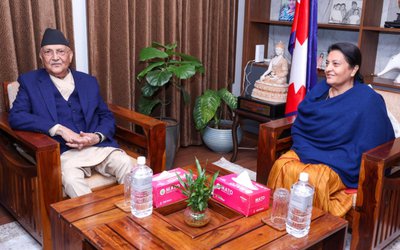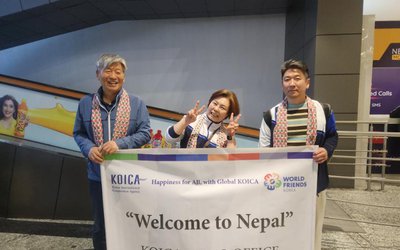
At a time when UCPN-Maoist leader Puspa Kamal Dahal's recent trips to Nepal's two neighbors, India and China, has been getting prominence, the visit of UCPN-Maoist leader and former prime minister Dr. Baburam Bhattarai to Australia is outside of the limelight.
Since a leader like Bhattarai paid such a visit to Australia, one cannot deny the fact that he too might have met certain important personalities from various countries. Interestingly, all the populist media maintained a tight lip. So far as Prachanda's visit is concerned, it received much publicity.
As Maoist leader Prachanda paid the visit under the invitation by both the neighbors as a leader of UCPN-Maoist party, he tried to present his visit as a visit of Nepal's high officials. "I talked about a whole gamut of bilateral issues with the leaders of both the countries. If they support us, we can guarantee their security," thundered UCPN-Maoist leader Prachanda.
Prachanda doesn't represent the state of Nepal and is in no position to take any official decision on any bilateral matter. Indian and Chinese sides can understand only the state representatives of Nepal. At present Dr. Ram Baran Yadav, president of Nepal, Khil Raj Regmi, chairman of council of ministers, and Madahav Prasad Ghimire, foreign and home minister, can give assurances on bilateral national issues.
"Who is Prachanda to speak on behalf of Nepal's state?" asked a former Nepalese diplomat on condition of anonymity. UCPN-Maoist chair Prachanda met Indian Prime Minister Dr. Man Mohan Singh, foreign minister and national security advisor during his stay in India and Chinese president, vice president and other government officials in China. “I don't think India and China as states made any official commitment with Prachanda."
"Prachanda's visit is not different than the visit paid by the official visit of party leaders from Nepal from time to time. I don't think there is a need to make any comment on it," said RJP leader Surya Bahadur Thapa in a radio interview.
Prachanda is not the first politician to violate the international convention. Former prime minister late Girija Prasad Koirala even accepted the credential of ambassador as acting head of state. Such practices were against Vienna Convention.
According to International conventions and practices, only state and person representing state can talk on bilateral issues and sign any agreement. If that is so, what prompted Prachanda to speak on sensitive bilateral issues? His proposal for trilateral cooperation´ involving India, Nepal and China created a controversy in India.
Indian foreign minister Salman Khurshid said to visiting Nepalese journalists last week: "You [Nepal] are friends and tell them [China] to be good to India also. And if you like to tell us to be good to them, let us all be good to each other. But please do not give them [China] anything that will hurt India."
This will not only ensure political stability and development in Nepal, but also in entire South Asia. Also, it will eventually help realize the trilateral cooperation that Nepal wishes to see.
- UML POLITCIS: Oli Vs Bhandari
- Apr 29, 2025
- FORMER KING GYANENDRA: Bating Constituional Monarchy
- Apr 28, 2025
- NC-UML COALITION: In Turmoil
- Apr 27, 2025
- TEACHERS ON STRIKE: Students' Future In Jeopardy
- Apr 25, 2025
- NEPAL-THAILAND: Joint Business Council
- Apr 13, 2025















